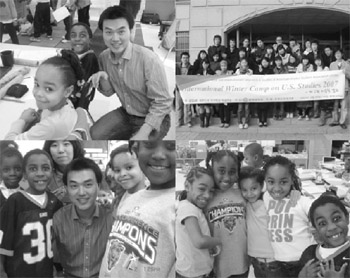
By Lee Min-ChulNational Strategy Institute &Catholic University, American Studies
Understanding of Korea's race issues through American Studies The International Winter Camp on U.S. Studies 2007 was held at Pyung-Taek University last February sponsored by ASSA(American Studies Students Association in Korea) and U.S. embassy in Korea. I participated in the camp with honor as a member of ASSA. The topic of this year's camp was African American's History and Culture. The reason we chose African American's life as a topic of the camp was U.S. is composed of many different kinds of ethnic groups, so we'd like to understand U.S. society by studying of African American's discriminated history, culture and life which is not familiar with us. I could get two thoughts as I taking part in the camp. One is discriminations for Non-Whites groups in U.S. society and the other is race issues in Korea which is already in progress. It is a kind of paradox. I have never knew that they were severely discriminated in U.S. history before I join the camp although I major American Studies. And many different ethnic groups from all over the world in U.S.including Blacks, Asians and Latinos also have been discriminated as they are adapting themselves to new circumstances. We blame Americans and sometimes feel anger for those discriminations when we see the sorrow and pains of them, but we have to think about our attitudes for foreign workers in Korea. We criticize the discrimination to us in U.S., but now we do the same to foreign workers in Korea. We have to think about this. Foreign workers in Korea Although we started to import foreign workers since mid-1980s for the harmony of labor, we have now approximately 330,000 foreign workers, and more than half of them are assumed to be illegal workers. Before the conclusion of legality and the social consent of acceptance they are already members of our society. It is necessary for us to reconstruct the relationships between foreign workers and us and recreate the new idea of the human rights to keep the social status before we knew it. We can easily meet foreign workers in a bus or a train. Some of them created regional community by themselves such as Philippine village although it is small. The movement of labor from developing countries especially South East Asian countries to the Korean labor market due to the needs of simple labor forces in the past is now more verified into direct ways such as marriage. It is no more strange for us to hear the stories about foreign workers who left their hometown with Korean Dreaming and Vietnamese woman to get marry Korean men.. It's time to consider Korean immigration and how to live harmoniously with them together seriously. Crossing Korea's Internal Border I did a computer search to get some information for foreign workers in Korea. I could fortunately(?) find many groups that help them. But it may prove that there are still many foreign workers who are discriminated in Korean Community. We can just laugh off the Blanca story which was very popular to us, "My boss is bad~? but it may give a severe pain to them. We all have been living in the Korean Peninsula with a pride and self-conceit as a member of a nation state for more than 5,000 years. But it is changing. There are many Vietnamese women got married to Korean man in rural community, and it is not too difficult to meet foreign workers on a street. More and more foreign workers will live in Korea with us in the future. We don't have to experience African American's sad history which was repeated over again in U.S. society. And there is no necessity for us to pay social and economic costs because of this problem. This is why we have to study American Studies, and this is why we have to keep our eyes on this issue. The most important thing to solve this task is our open minded attitude for foreign workers. It's time to keep in mind the first clauses of U.S. constitution, "I'll men are created equal.

